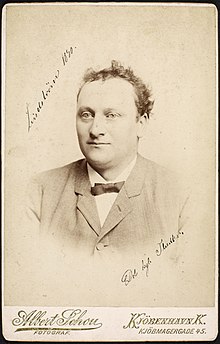Viggo Lindstrøm

Viggo Lindstrøm (12 January 1858 – 17 June 1926) was a Danish actor and theatre director, founder of Det Ny Teater in Copenhagen. He was married to the actress Vera Lindstrøm.
Biography
Lindstrøm was born on 12 January 1858 in
He was then hired by a development company, Bona, to head the establishment of Det Ny Teater. On its opening in 1908, it was the second largest and most advanced theatre in Denmark but he left after three years due to an insignificant debt.[2]
That same year he had his debut on film and after that appeared sporadically in films from various companies. In the first half of 1920 he worked for
Active until his death in 1926, his two last appearances were in Ole & Axel films for the Palladium production company.[3] He is buried in Frederiksberg Cemetery.
Films
- Vildmanden (1908)
- Den farlige leg (1911)
- En behagelig fejltagelse (1912)
- Det berygtede hus (1912)
- Hjertedoktoren (1913)
- Buddhas Øje (1915)
- Amors Spilopper (1916)
- Blade af Satans bog(1919)
- Gudernes Yndling (1920)
- Hans gode Genius (1922)
- Jafet, der søger sig en Fader I - IV (1922)
- Den sidste af Slægten (1922)
- Smil og taarer (1923)
- Grønkøbings glade gavtyve (1925)
- Du skal ære din hustru(1925)
- Den store Magt (1925)
- Ulvejægerne (1926)
See also
References
- ^ "Viggo Lindstrøm". danskefilm.dk. Retrieved 2011-01-27.
- ^ a b "History of the theatre". Det Ny Teater. Retrieved 2011-01-27.
- ^ a b "Viggo Lindstrøm". Danish Film Institute. Retrieved 2011-01-27.
